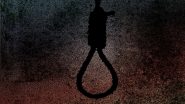New Delhi, Dec 20 (PTI) The Supreme Court on Friday said it was important to establish proof of direct or indirect acts of instigation by the accused to attract the abetment of suicide offence.
A bench of Justices B R Gavai and K V Viswanathan said in order to sustain Section 306 of IPC, dealing with abetment of suicide, it must necessarily be proved that the accused contributed to the suicide by some direct or indirect act.
"To attract the offence of abetment to suicide, it is important to establish proof of direct or indirect acts of instigation or incitement of suicide by the accused, which must be in close proximity to the commission of suicide by the deceased," it said.
The court's observation came when it discharged a man and his family members in a case of alleged abetment of suicide of his 25-year-old wife.
The apex court said the incitement must be in close proximity to the commission of suicide by the deceased.
It said such instigation or incitement should reveal a clear mens rea to abet the commission of suicide and should put the victim in such a position that they are left with no other option but to die by suicide.
It said abetment involved a mental process of instigation or intentionally aiding another person to do a particular thing.
"Without such mens rea on the part of the accused person being apparent from the face of the record, a charge under the aforesaid section cannot be sustained," it said.
The top court delivered its verdict on an appeal filed by three persons -- the husband, his father and brother -- challenging the Bombay High Court's October 2022 judgement, dismissing their discharge plea against a trial court order refusing their discharge from the case.
Apart from Section 306, they were charged under Section 34 (common intention) of IPC.
The apex court said a young 25-year-old woman had lost her life in an unfortunate incident.
"However, in the absence of sufficient material to show that the appellants had intended by their words to push the deceased into such a position that she was left with no other option but to commit suicide, continuation of criminal proceedings against the appellants would result in an abuse of process of law and as such, we are inclined to allow the appeal," it said.
The bench said on March 20, 2015, a police station in Ahmednagar registered an accidental death report after the woman's brother said his sister had died by suicide at her parents home where she was living for the past two years.
On March 25, 2015, the woman's mother was stated to have lodged a complaint at the police station saying her daughter married in November, 2009, but was mentally and physically tortured at her matrimonial home.
A criminal case followed the complaint against the husband and his family members under the Protection of Women from Domestic Violence Act, 2005.
The bench said during the pendency of the case, a "maha lokadalat" was held in the district court in February, 2015 which was attended by the parties.
The woman's mother claimed on the day of the maha lokadalat, the parties were not wiling to reach a compromise and her daughter was advised by the estranged husband to re-marry but she died by suicide on March 20, 2015.
The bench said the law on abetment was crystallised by a plethora of judgements by the apex court.
It said the top court had consistently taken the view that instigation or incitement by accused was the gravamen of abetment of suicide offence.
"...in order to link the act of instigation to the act of suicide, the two occurrences must be in close proximity to each other so as to form a nexus or a chain, with the act of suicide by the deceased being a direct result of the act of instigation by the accused person," said the court.
The "maha lokadalat" incident occurred on February 17, 2015, whereas the suicide was on March 20, 2015, it said.
"There is enough gap between the two incidents to render the instigation or incitement by the appellants, nugatory," the bench held.
(This is an unedited and auto-generated story from Syndicated News feed, LatestLY Staff may not have modified or edited the content body)













 Quickly
Quickly
















